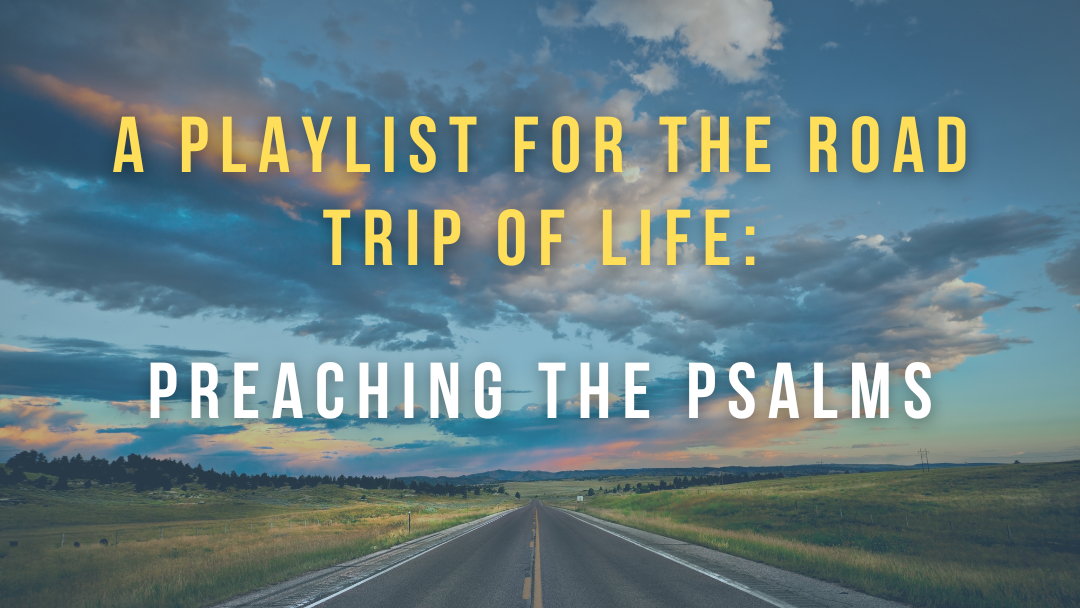Music Moves and Poetry Shakes
Every time I hear Steve Perry sing “Open Arms,” I picture our high school cafeteria turned into a dance floor⸺a little Stranger Things meets Pretty in Pink. When I hear “Won’t Get Fooled Again,” by the Who, it is dusk at the Michigan shore. I’m holding a lead pipe in both hands with a bottle rocket hanging out one side, lit and ready to fly. The Indigo Girls “Closer to Fine” reminds me of John and the coffee shop performances, playing guitar for aspiring vocalists, Kate and Janette. “Back in Black” by ACDC produces images of school assemblies and the Knack’s one-hit-wonder, “My Sharona,” evokes fond memories of my childhood buddy, Sean.
Music moves us. Poetry shakes us. It broaches our emotions and captures our life’s experiences.
Similar to the compilation of songs from our past, the Psalms are a collection of poetic songs that plumb the depths of our emotions and capture our experience with God. They evoke a particular moment of our childhood, a struggle of our adolescence, or a confidence or fear that we’ve faced as adults. They are a playlist for the road trip of life.
A Musical Compilation over the Decades of Our Lives
Regardless of the medium that delivered the tunes to us: radio, jukebox, record player, 8 track, cassette tape, CD, Mp3, iTunes, Pandora, or Spotify, we all have a playlist of songs that tug on our emotional memory. They comfort us, encourage us, relax us, and hype us up.
What would your compilation look like?
What emotional memories does your playlist evoke for you?
Like those playlists that accompany us on our life’s journey, the Psalms are a playlist for our relationship with God on the winding roads through life’s peaks and valleys. The Psalms share an emotional resonance with us in every facet of life’s joys and sorrows. From weariness over our own failures, illness, defeat, and grief to victory and elation for the wins in life, the good relationships, the abundance, and the growth, the Psalter taps our soul.
TPW’s Summer Sermon Series: A Playlist for the Road Trip of Life
This is why we are creating a summer sermon series on the Psalter. Think of it as a playlist of songs from the Psalms that spans the width of the human experience. It isn’t exhaustive and may not include all of your own favorites, but we believe it fairly represents the various themes from the Psalter. There are psalms of praise, lament, thanks, and trust. Many of the Psalms included have soothed our hearts at particular times in our life’s road trip and remained meaningful songs for us in our continued journey.
If you decide to join us in this summer Psalms series, you may find it helpful to switch out a psalm or two for those that speak more profoundly to you and your congregation.
Tips for Preaching on the Psalms
Do you avoid the Psalms? Do you tend to preach prose over poetry? It’s not uncommon.
There is no need to be intimidated by preaching the poetic.
Below we’ve included a little insight into preaching the Psalms which includes a section on preaching poetry and introductory quotes about the Psalms that helpfully frame the intent and purpose of the Psalter. We have also included some of the primary commentaries we used in creating the series.

A Playlist for the Road Trip of Life
Summer is almost here! As your congregations start to set out on summer trips, help them to see the Psalms like their own road trip playlists, only for their life-journey.
Twelve weeks of sermon guides, illustrations, quotes, and discussion questions help you to craft sermons that open up the Psalms to your flock, along with suggested liturgy to bring the themes from the Psalms to life in worship.
There are seven posted now—more to come soon!
TPW Subscription Content
Preaching Poetry
As poems, the songs of the Psalter include literary devices like metaphors, similes, imagery, allusion, and repetition—which we preachers know how to handle. And though you can dive into the varying poetic devices employed: chiasm, parallelism, and assonance, I urge you to home in on with the heart of the Psalmist’s cry.
You may want to ask some questions of the Psalm.
- What is the occasion for this particular Psalm?
- Does it arise from an occasion of joy in the Psalmist’s life or during a time of threat or fear?
- How are the circumstances that created this Psalm similar to those in our own lives and those of our community?
- What posture towards God does this Psalm take? How can we relate?
When you have the heart of the Psalmist’s cry, draw out the metaphors, similes, and imagery of the psalms for your people. They are the literary devices meant to touch the soul—both when they were originally written and now.
Just think of Psalm 42:1 for example, “As the deer pants for streams of water, so my soul pants for you, O God.” We can all relate to thirsting for physical water when we feel dehydrated. We can also observe the deer of the forest and field who search for a source of water. This simile is a powerful one when applied to the spiritual thirst of our souls for God, for something bigger and more meaningful than ourselves.
Above all, be cognizant of the way that the particular Psalm you preach touches your own heart and life and that of the church of which you are a part. There may be a story from your own life that gives insight to you and your people into the power of the Psalter to guide and direct us along the turns and twists of life’s road.
The heart’s cry of the Psalmist speaks to our hearts. For me, I vividly remember sitting at Lawrence’s hospital bedside. I was a thirty-five year old pastor with limited experience with death and dying. Lawrence was a ninety-five year old member of our community. Until recently, he’d been in great health, relatively speaking, but now he found himself in the hospital facing the great shadow. When I first arrived, we engaged in some small talk, but I could tell from his face that he was distressed. As I sat down next to his bed he turned his face towards me and his eyes grew wide. He grabbed my arm and said, “Scott, I’m scared.” His words and the fearful tone in which they were said hit me hard. Lawrence had always presented as a calm and confident man of faith, but in this moment, his rheumy eyes expressed something child-like, a fear and doubt that I had never heard in him. He asked for me to pray Psalm 23 at this moment. Nothing else could better express both the reality of his fear and the reality of his faith in the Good Shepherd who’d accompany him in his journey through the valley.
I am certain that you have your own experiences with the power of the Psalms in your life and that of your community—when they articulate our situation and sentiment with words better than any of our own. May God use this series to put words to your own experience and emotion and to those of your community! May the Psalter become a playlist for the road trip of life for you and the people to whom God has called you!

Quotes to Help You Preach on the Psalms
As we’ve been working on the series, we have found quite a few quotes that have been helpful by way of introduction.
They frame the purpose and power of the Psalter in the life of the individual and community. I’ll share a few here. You may very well use some of them as an introduction to the book of Psalms for your people. .
The last quote included is by one of my favorite commentators on the Psalms, James Mays. He articulates what I think is the heart of the Psalter for many of us. Like the songs that accompany us in life, the Psalms provide a discovery of sorts. In them we recognize our own circumstances, our own emotional state, who we are, and the language to express it. Like the music of U2 defined and expressed the emotion and experience of many adolescents of my generation, the Psalms do the same for the collection of humanity who have read, sang, and prayed through them at just those moments when their experience and emotion needed voice.
Athanasius, Ad Marcellinum
“It is my view that in the words of this book the whole human life, its basic spiritual conduct and as well its occasional movements and thoughts, is comprehended and contained. Nothing to be found in human life is omitted.”
Martin Luther, Luther’s Works, 34:245
“Might well be called a little Bible. In it is comprehended most beautifully and briefly everything that is in the entire Bible. It is really a fine enchiridion or handbook.”
John Calvin, Commentary, p. xxxix
“There is nothing wanting which relates to the knowledge of eternal salvation.”
Dietrich Bonhoeffer, Life Together, p. 44
“The Psalter occupies a unique place in the Holy Scriptures. It is God’s Word, and with a few exceptions, the prayer of men as well.”
James Mays, Interpretation, A Biblical Commentary for Teaching and Preaching: Psalms, pp. 23-24
“Down through the ages many have said they found themselves and their feelings and circumstances in these prayers. The closer truth is that one finds oneself through these prayers. One comes to know liturgically and theologically who we are and what we need and one finds language to say it all to God.”
Commentaries to Consult
We are excited for you to get your hands on our Sermon Series. But you may want to go deeper. There are so many great commentaries out there! Here is a list of those that were particularly helpful to us. Why these? They are accessible commentaries for preachers and teachers of the Bible that don’t get lost in the weeds of literary and historical criticism (although each of these scholars has spent considerable time identifying the “flora” and “fauna” of the field). Furthermore, they are theologically and pastorally rich in their insights—what most of us need when preparing to preach.
- Bullock, C. Hassell. Teach the Text Series: Psalms, Volume 1: Psalms 1-72. Grand Rapids: Baker Books, 2015.
- Bullock, C. Hassell. Teach the Text Series: Psalms, Volume 2: Psalms 73-150. Grand Rapids: Baker Books, 2017.
- Mays, James. Interpretation, A Biblical Commentary for Teaching and Preaching: Psalms. Louisville: John Knox Press, 1994.
- Schaefer, Konrad. Berit Olam, Studies in Hebrew Narrative & Poetry, Psalms. Collegeville, MN: The Liturgical Press, 2001.
- Weiser, Artur. The Psalms. Philadelphia: The Westminster Press, 1962.
Want more options? Our best tip is to reach out to your trusted colleagues and friends in ministry. Collaborate, build your interpretative community, and draw on the experience of your co-laborers—you can get plenty of advice online—but there is nothing like a trusted guide.

Scott Bullock is a Board Member and Contributor with The Pastors Workshop. He is an ordained Presbyterian minister who has served churches in Illinois, New Jersey, and California. He holds an MA in New Testament Studies from Wheaton College, an MDiv from Fuller Theological Seminary, and a ThM in New Testament from Princeton Theological Seminary. Scott is married with three teen-aged children.
Don’t Miss
The Latest From Our Blog
New Site Launches Tomorrow!
Watch this Space! Tomorrow (May 29) is the official launch of the new The Pastor's Workshop site! Return to this blog tomorrow morning for a post highlighting the new features and explaining how subscribers can get on and start using the site! Here are some new...
How You Can Prep for Pentecost
This was originally posted on May 12, 2016 on https://huffpost.com Pentecost Came Like Wildfire I'm lying on an ice pack early this morning, doing my back exercises and listening to Pray as You Go, a tool for meditation, with monastery bells, music, and a Bible...
Sacred Spaces: the Church Forests of Ethiopia
Let's Go to Ethiopia! Here’s a fun exercise with a spiritual payoff. Go to Google Maps and view aerial images of the South Gondar zone of Ethiopia. Use this button:When the page loads, you'll see a light brown countryside, mostly farmland. There are thin lines of dark...




